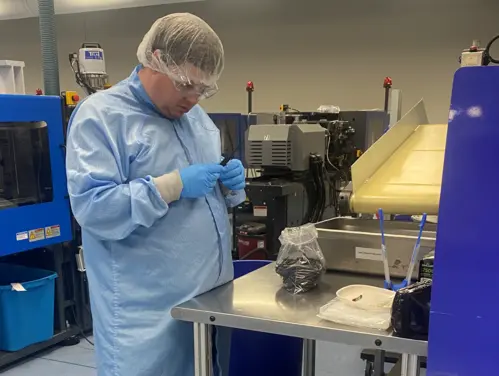More than 10 years after his first conversations with a vocational counselor, Mark Baldwin finally feels like he’s arrived at where he wants to be – in a job where he can be just another part of the team.
“I just have always wanted to be an independent worker,” he said. “I just wanted to be a fulltime worker.”
Baldwin has been working for just over a year at Accumold, an Ankeny plastic injection molder, overseeing an automated machine and using a microscope to check for defects in very small parts. The role is a good fit, Baldwin believes, because it allows him to work at an active-but-reasonable pace, lessening the anxiety that can come when his Asperger’s Syndrome makes it difficult to keep up in a high-stress environment.
“It keeps me so busy, and it’s a good work environment,” he said of Accumold. “I like a good work environment where nobody’s yelling at you for making a slight mistake.”
Mark launched his journey to vocational independence in October 2009, when he first began working with Iowa Vocational Rehabilitation Services (IVRS) while attending Colfax-Mingo High School. [Under a recently approved state government reorganization plan, IVRS will become a division within Iowa Workforce Development effective July 1 – thereby expanding and improving Iowa’s ability to offer a wide variety of workplace services to the people who need them most.]
“I think Mark’s story can help others who have struggled for a long time to find the right employment,” said IVRS Rehabilitation Supervisor Kathy Davis. “Mark had many experiences in the world of work before he found the right fit for his interests, skills, and abilities. Mark was determined to work his way off (Social Security) benefits. He had the support of this family and IVRS to continue working towards his goal.”
After his high school graduation in 2014, IVRS guided Baldwin through a long series of programs and job counselors, beginning with the Selected Training Received in Vocational Education (STRIVE) program at Des Moines Area Community College.
Aptitude tests pointed Baldwin toward classes in criminal justice, and he accumulated nearly two years of college credits. However, he and his family later began to think that impractical as a long-term career. So, IVRS job coaches helped him land other positions, including data entry at a medical office and a part-time slot at an Ankeny movie theater.
Seeking more, Baldwin applied for a job with Amazon Fulfillment in Bondurant. He got the position. Kathy Davis arranged temporary on-the-job coaching to help him learn the proper way to fulfill orders.
Amazon bosses praised the accuracy of Baldwin’s work, but they also pushed him to go faster. Accommodations were made, but he still had difficulty keeping up. Eventually, an anxious Baldwin instigated the move to Accumold – where things appear to have finally clicked.
This is how vocational rehabilitation is supposed to work, Davis explains – a lot of labor over a long period of time to educate a client with a disability, test out his/her abilities, and find the right workplace where they can succeed.
“You don’t always know how it’s going to work,” she said. “Sometimes, it’s trial and error. You have to place them and start seeing.”
Jeanine Baldwin, Mark’s mom, agrees, calling the last decade “a learning process for all of us.” She praised the faith and persistence of Davis in helping Mark find an occupation he enjoys.
“People think it’s going to be simple or quick and easy, and someone’s going to come in with the magic answer,” Jeanine said. “It’s not. You have to stick to it and go through a lot of things that you know probably aren’t going to work. But then sometimes, some of them work.”
When skills line up and the right accommodations are made, employers can suddenly find them with tremendously valuable employees.
“I would just say that Mark has been a great addition to the team,” said Zach Boyer, micro mold production manager at Accumold. “When he started, we worked with him on what learning style worked best for him, and he has made great progress on learning the jobs and being able to do the work.”
It’s now been three years since Baldwin stopped receiving Social Security benefits. There are no more job coaches, and IVRS recently closed his file (although there are options to reopen the case if it becomes necessary down the road).
As evidence of Baldwin’s work ethic, Davis recounted a winter ice storm when Mark put his car into a ditch on the way to Amazon. He first called Jeanine to ask that she send a tow truck. Then, he started walking the rest of the way into work.
“That is the type of employee Mark is,” Davis said. “He will never miss work, and he will never be late.
“It just makes him feel too good to get up every day and go to work.”
For more information about the services available through Iowa Vocational Rehabilitation Services, visit ivrs.iowa.gov.
